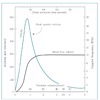Abstract
The greatest advances in understanding and treating stroke have occurred during the past 30 years. The advantages of ultrasound for vascular diagnosis are well known : it is a fast, portable, non-invasive, repeatable and inexpensive technique. Among various clinical situations for the application of ultrasound to stroke care, the best established ones include : ① early detection and characterization of extracranial atherosclerosis and occlusive diseases especially at the carotid bifurcation ; ② evaluation of consequences of proximal arterial occlusive disease on the distal cerebral vasculature ; ③ follow-up of the natural history and response to treatment of acute arterial occlusion that causes hyperacute stroke ; ④ detection of microemboli associated with cardiac and aortic pathology and carotid artery surgical manipulation ; and ⑤ follow-up of the time course and reversibility of cerebral vasospasm after subarachnoid hemorrhage. The field of ultrasonic diagnosis also has detractors and limitations. Even now, the technique is 'operator-dependent'in terms of the accuracy and validity of its results. Newer technology has provided significant advances in this regard ; however, it is necessary for each laboratory to maintain a strict quality control in order to maximize the benefits that this powerful technology can provide.
Figures and Tables
References
1. Kremkau FW. Doppler ultrasound : principle and instruments. 1995. Philadelphia: WB Saunders.
2. Alexandrov AV, Brodie DS, McLean A, Hamilton P, Murphy J, Burns PN. Correlation of peak systolic velocity and angiographic measurement of carotid stenosis revisited. Stroke. 1997. 28:339–342.

3. Executive Committee for the Asymptomatic Carotid Atherosclerosis Study : Endarterectomy for asymptomatic carotid stenosis. JAMA. 1995. 273:1421–1428.
4. North American Symptomatic Carotid Endarterectomy Trial Collaborators : Beneficial effect of carotid endarterectomy in symptomatic patients with high-grade carotid stenosis. N Engl J Med. 1991. 325:445–453.
5. Spencer MP, Reid JH. Quantitation of carotid stenosis with continuous-wave(c-w) Doppler ultrasound. Stroke. 1979. 10:326–330.

6. Pignoil W, Tremoli E, Poli A, Oreste P, Paoletti R. Intimal plus media thickness of the arterial wall : a direct measurement with ultrasound imaging. Circulation. 1986. 74:1399–1406.

7. Wong M, Edelstein J, Wollman J, Bond G. Ultrasonic-pathological comparison of the human arterial wall : verification of intima-media thickness. Arterioscler Thromb. 1993. 13:482–486.

8. Lehmann ED, Riley WA, Clarkson P, Goslin RG. Non-invasive assessment of cardio-vascular disease in deabetes mellitus. Lancet. 1997. 350:Suppl 1. 14–19.
9. Salonen R, Haapanem A, Salonen JT. Measurement of intima-media thickness of common carotid arteries with high-resolution B-mode ultrasonography : inter-and intra-observer variability. Ultrasound Med Biol. 1991. 17:225–223.
11. Grobbee DE, Bots ML. Carotid intima-media thickness as an indicator of generalized atherosclerosis. J Intern Med. 1994. 236:567–573.

12. Bots ML, Hoes A, Koudstaal PJ, Hofman A, Grobbee DE. Common carotid intima-media thickness and risk of stroke and myocardial infarction. The Rotterdam study. Circulation. 1997. 96:1432–1437.

13. Howard G, Burke GL, Szklo M, Tell GS, Eckfeldt J, Heiss G, et al. Active and passive smoking are associated with increased carotid wall thickness. The Atherosclerosis Risk in Communities Study. Arch Intern Med. 1994. 154:1277–1278.

14. Salonen R, Salonen JT. Progression of carotid atherosclerosis and its determinants; a population-based ultrasonography study. Atherosclerosis. 1990. 81:33–40.

15. Blankenhorn DH, Selzer RH, Crawford DW, Barth JD, Liu C, Alanpovic P, et al. Beneficial effects of colestipol-niacin therapy on the common carotid artery. Two-and four-year reduction of intima-media thickness measured by ultrasound. Circulation. 1993. 88:20–28.

16. Crouse JR 3rd, Byington RP, Bond MG, Espeland MA, Craven TE, Furberg CD, et al. Pravastatin, lipids and atherosclerosis in the carotid arteries(PLACII). Am J Cardiol. 1995. 75:455–459.




 PDF
PDF ePub
ePub Citation
Citation Print
Print






 XML Download
XML Download